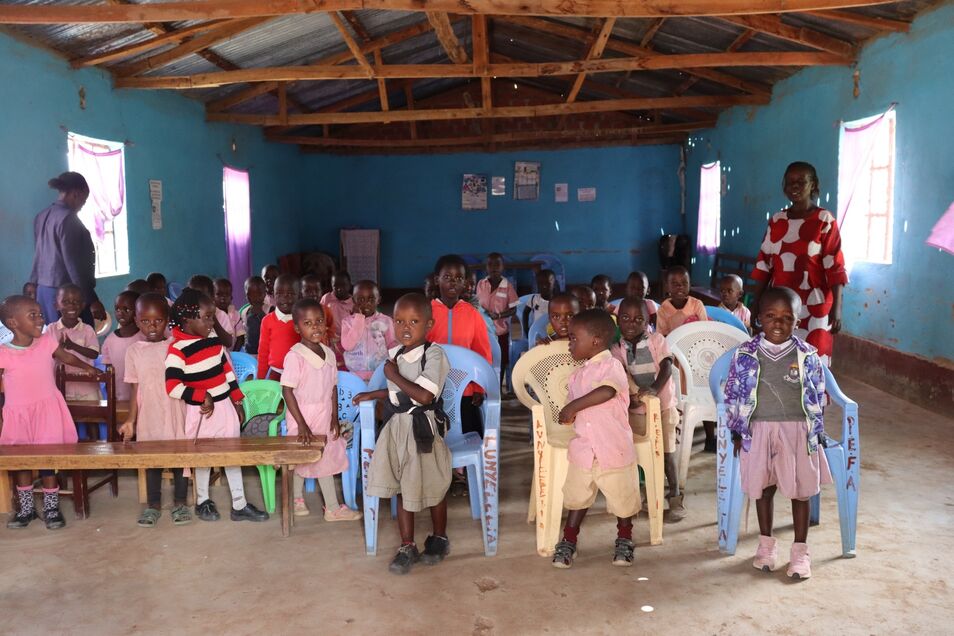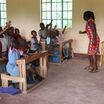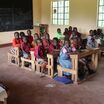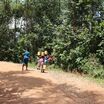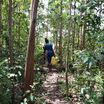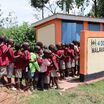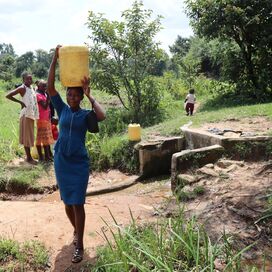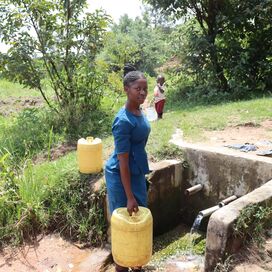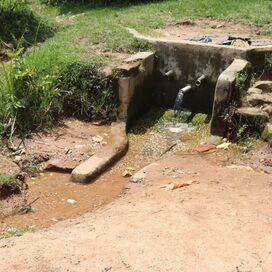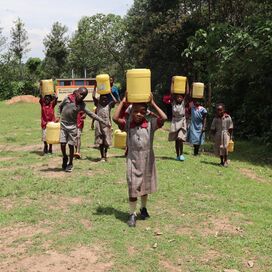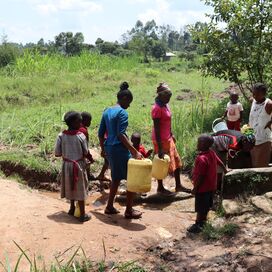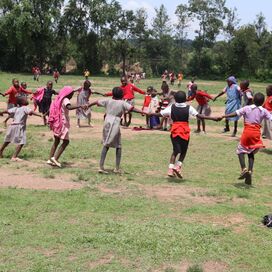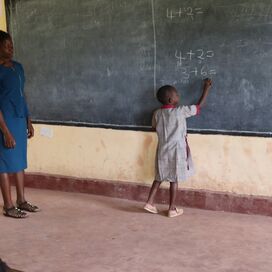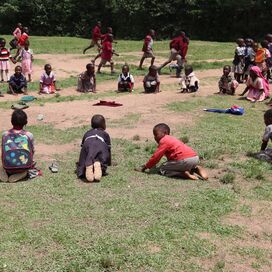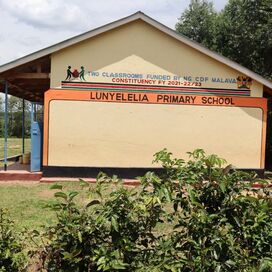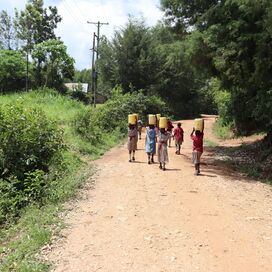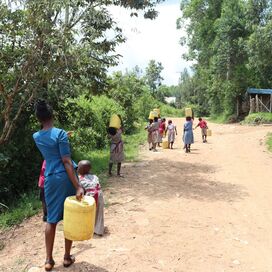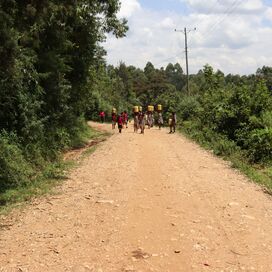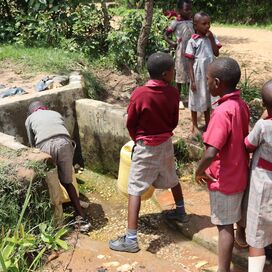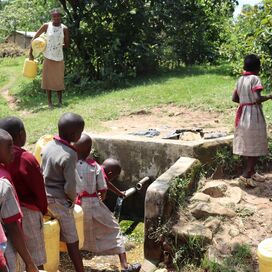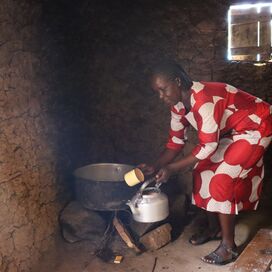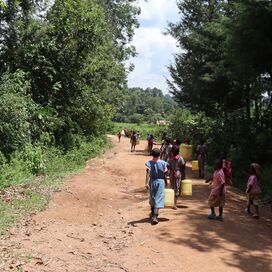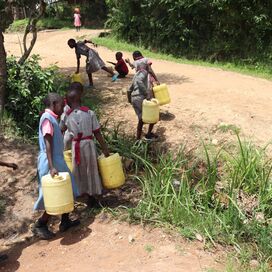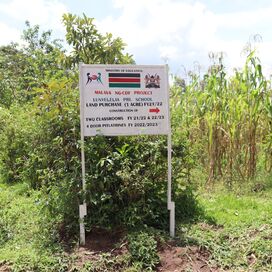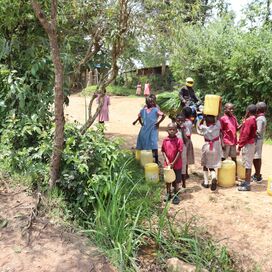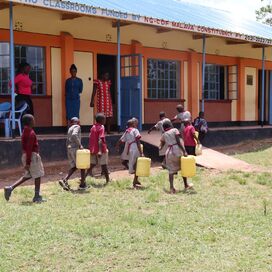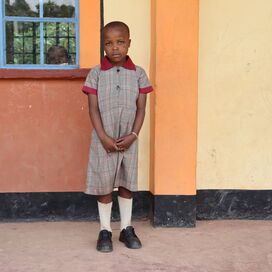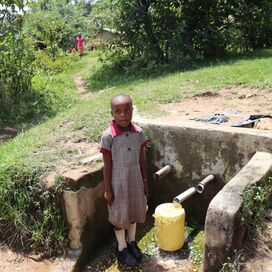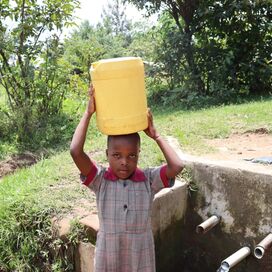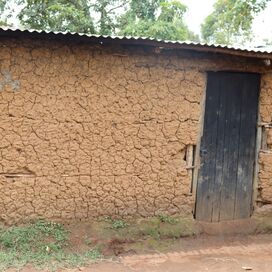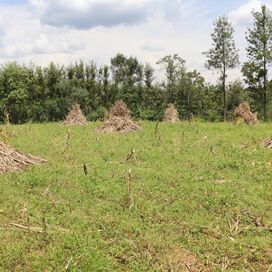Project
Lunyelelia Primary School
Lunyelelia Primary School was established in 2021. Prior to this school's establishment, families were sending their children to schools 1.5+ kilometers away, which put a strain on parents as they would escort their children to school, delaying their daily work. Today, the school has 135 students nad 6 staff/teachers.
The 141 students and staff of Lunyelelia Primary School face a water crisis each day. The young students must leave school, collect water from an overcrowded, faraway spring shared with community members, and the water they collect is contaminated.
Field officer Jemmimah Khasoha described the spring everyone relies on. "The main challenge or issue with the main and the only source of water is seasonality and congestion by the community members. During [the] dry season, the spring goes dry, forcing pupils to carry water from home."
"The water users, both the pupils and the community members, stand on top of the spring box, thus causing it to sink inside, making the environment unworthy for fetching clean drinking water. Some reported health consequences include diarrhea, stomachaches, vomiting, and typhoid. All these are caused by contaminated water," said Jemmimah.
"The school has no storage containers, which would help reduce the number of trips pupils go to fetch water. In this case, the pupils are asked to surrender their time of play to fetch water during break time and game time. Since the school is still young and the pupils are young too, giving them heavy tasks like carrying water makes them tired," concluded Jemmimah.
"It is tiresome to go get water to use in school. Many of my fellow pupils get flu because we don't wash classrooms and there is dust all over in class. We also don't get time to play because when we are not in class, we are going to get water. This makes school boring," said 7-year-old Vivian S., seen collecting water in one of the attached photos.
Field officer Jemmimah Khasoha described the spring everyone relies on. "The main challenge or issue with the main and the only source of water is seasonality and congestion by the community members. During [the] dry season, the spring goes dry, forcing pupils to carry water from home."
"The water users, both the pupils and the community members, stand on top of the spring box, thus causing it to sink inside, making the environment unworthy for fetching clean drinking water. Some reported health consequences include diarrhea, stomachaches, vomiting, and typhoid. All these are caused by contaminated water," said Jemmimah.
"The school has no storage containers, which would help reduce the number of trips pupils go to fetch water. In this case, the pupils are asked to surrender their time of play to fetch water during break time and game time. Since the school is still young and the pupils are young too, giving them heavy tasks like carrying water makes them tired," concluded Jemmimah.
"It is tiresome to go get water to use in school. Many of my fellow pupils get flu because we don't wash classrooms and there is dust all over in class. We also don't get time to play because when we are not in class, we are going to get water. This makes school boring," said 7-year-old Vivian S., seen collecting water in one of the attached photos.
Students being responsible for collecting water is not the only way valuable learning time is wasted. Since the children are so young and the spring is off the school campus, a teacher must accompany them when they collect water.
"There is time wastage to follow up with pupils when going to the spring since they are still young and need an adult to supervise them and guide them on the road. Many of them fetch water without washing [their] hands, so with dirty hands, [they] hold the fetching container and contaminate the water. This way of mishandling the water causes diarrhea and typhoid, which has affected me and them severely. Lack of enough water makes us wash classrooms once per week, thus making it hard for us to maintain pupils' hygiene," said 29-year-old teacher Harriet Busieka, shown below, walking back to school with students after collecting water.
The installation of a well at the school will enable students and teachers to have ready access to water whenever they need it so they can focus on learning. Then, Vivian and the other students will have the energy needed for learning and still have time to play with friends.
The installation of a well at the school will enable students and teachers to have ready access to water whenever they need it so they can focus on learning. Then, Vivian and the other students will have the energy needed for learning and still have time to play with friends.
What Your Support Will Do:
New Well
We conducted a hydrogeological survey at this school and the results indicated the water table beneath it is an ideal candidate for a borehole well. Due to a borehole well's unique ability to tap into a safe, year-round water column, it will be poised to serve all of the water needs for this school's large population, even through the dry months.
We conducted a hydrogeological survey at this school and the results indicated the water table beneath it is an ideal candidate for a borehole well. Due to a borehole well's unique ability to tap into a safe, year-round water column, it will be poised to serve all of the water needs for this school's large population, even through the dry months.
The school will help collect the needed construction materials such as sand, rocks, and water for mixing cement. They will also provide housing and meals for the work team, in addition to providing local laborers. We will complement their materials by providing an expert team of artisans and drilling professionals, tools, hardware, and the hand-pump. Once finished, the school's students and staff will then use water from the well for drinking, handwashing, cooking, cleaning, and much more.
Handwashing Stations
The student health club will oversee the two new handwashing stations we will provide, and make sure they are kept clean and in working condition. The club leaders will fill the handwashing stations with water daily and make sure they are always supplied with a cleaning agent such as soap or ash.
The student health club will oversee the two new handwashing stations we will provide, and make sure they are kept clean and in working condition. The club leaders will fill the handwashing stations with water daily and make sure they are always supplied with a cleaning agent such as soap or ash.
Latrines/Toilets
We will construct two triple-door latrine blocks using local materials that the school will help gather. Three doors will serve the girls and three doors will serve the boys. All of these new latrines will have cement floors that are designed to be easy to use and to clean. And with a borehole right on school property, there should be enough water to keep them clean.
Training on Health, Hygiene, and More
We will hold a one-day intensive training session with students, teachers, and parents. This training will cover a wide range of topics including personal and environmental hygiene; and the operation and maintenance of the borehole, latrines, and handwashing stations. There will be a special emphasis on handwashing.
We will construct two triple-door latrine blocks using local materials that the school will help gather. Three doors will serve the girls and three doors will serve the boys. All of these new latrines will have cement floors that are designed to be easy to use and to clean. And with a borehole right on school property, there should be enough water to keep them clean.
Training on Health, Hygiene, and More
We will hold a one-day intensive training session with students, teachers, and parents. This training will cover a wide range of topics including personal and environmental hygiene; and the operation and maintenance of the borehole, latrines, and handwashing stations. There will be a special emphasis on handwashing.
Our team of facilitators will use a variety of methods to train, including participatory hygiene and sanitation transformation, and asset-based community development. We will initiate a student health club, which will prepare students to lead other pupils into healthy habits at school and at home. We will also lead lectures, group discussions, and provide illustrative handouts to teach health topics and ways to promote good hygiene practices within the school including handwashing and water treatment. We will then conduct a series of follow-up trainings before transitioning to our regularly scheduled support visits throughout the year.
We and the school strongly believe that all of these components will work together to improve standards at this school, which will help lead to better student academic performance and will help unlock the opportunity for these students to live better, healthier lives.
0.3820988 latitude, 34.8715174 longitude
H2O for Life is not a WASH (water, sanitation and hygiene) project implementer. We have partnerships with non-governmental organizations (NGOs) implementing WASH in Schools projects around the world. Our NGO partners match funds needed for each school project. We also have a generous donor that provides us with an interest-free loan that, along with matching funds, allows for many projects to be started or possibly even completed before total funds have been raised. In rare situations we reserve the right to reallocate funds to alternate project(s).
Questions? Ask us at 651-756-7577 or info@h2oforlifeschools.org.
